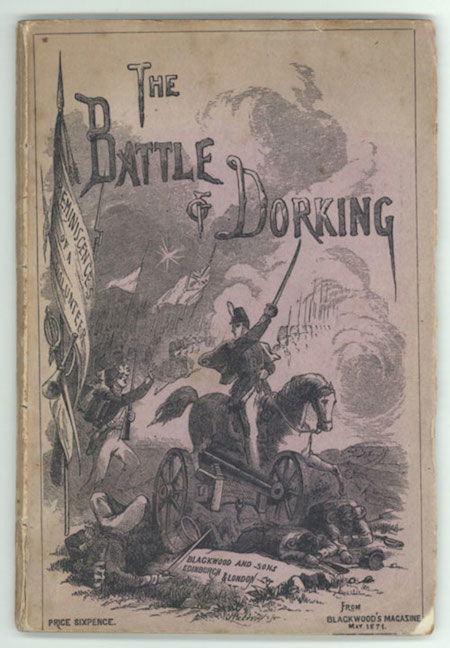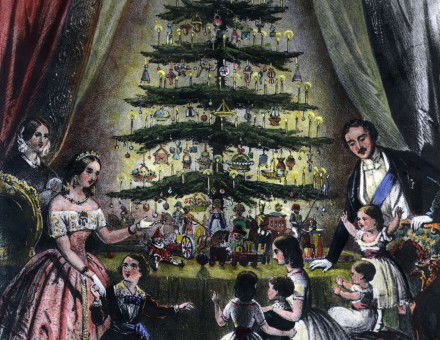Warnings from the Future
A recent book warns that current events will lead to war between NATO and Russia. It follows in a long tradition of military writers prophesying that weakness at home will lead to invasion and war.

It may have been a coincidence that led Sir Richard Shirreff, the recently retired Deputy Supreme Allied Commander Europe, to publish his new book through a publisher based at Carmelite House in London but it was, nevertheless, a coincidence filled with a certain meaning. Shirreff’s book, 2017 War with Russia, came out in mid-May and, as the title suggests, portrays a fictional war between NATO and Russia one year hence. It is a warning from the future, a ‘scare’ story meant to shock its readers out of a dangerous complacency. However, despite pointing towards future events, 2017 War with Russia owes a great deal to the past and to a particularly British form of fiction that was pioneered by another British Army officer in the wake of the Franco-Prussian war. In his foreword to the book, Admiral James Stavridis argues that ‘[t]his is no ordinary “future history”, for it is told by a brave and seasoned warfighter’. But in the Victorian and Edwardian era there were numerous service writers who tried to argue along remarkably similar lines.
In Shirreff’s mixture of fact and fiction, Vladimir Putin poses a direct threat to Western Europe, but he is not the author’s main target. Instead, Shirreff directs his ire towards the British political establishment and the Parliamentary institutions that keep the armed forces undersupplied and unprepared for a future conflict. As the preface states, Britain has become ‘more interested in protecting welfare and benefits than maintaining adequate defences’. Whether intentionally or not, this echoes the statement made by Lieutenant-Colonel George Tomkyns Chesney in a story published anonymously in Blackwood’s Magazine in May 1871. In ‘The Battle of Dorking’ Chesney decried how ‘in our folly we were too careless even to insure our prosperity’. He argued that lessons should have been learned from what was happening on the Continent, where the Franco-Prussian war had led to the rise of a German Empire. In the story, as these lessons about the need to prepare are not heeded, Britain is invaded and defeated by a German army. While Shirreff portrays a British Prime Minister more worried about newspaper headlines than dealing resolutely with Russian aggression, Chesney was somewhat more blunt in his criticism of the entire political system, newly reformed after the 1867 Reform Act. ‘Parliament-rule’, he argued, ‘was beginning to give way to mob-law.’ In both cases, the external threat is a consequence of short-sighted policies at home, in Britain.
Chesney’s story marked the start of this form of speculative literature, and over the next decades numerous fictional tales of invasions, planned invasions, blockades and military disasters or victories in the near future were published, in Britain and beyond. In November 1914, the satirical magazine Punch joked that:
Amongst the (more or less) skilled industries that have been gravely affected by the outbreak of hostilities must now be placed the making of prophetic fiction. It is calculated that the number of novels dealing with ‘The Next Great War’ that have had to be scrapped must run well into four figures.
Service writers, from army and navy, continued to write fictional future-war stories throughout this period and, although The New Battle of Dorking, written by Colonel F.N. Maude in 1900, was nowhere near as successful as its namesake, defence experts were frequently called on to lend credibility to fantastical texts. When William Le Queux, perhaps the most prolific author of invasion-scare and spy stories in the pre-1914 years, wrote The Invasion of 1910, his tale was endorsed by Lord Roberts, one of the most famous military personalities in Britain. Later republished as a book, the story was first serialised in the Daily Mail in early 1906, and Roberts heartily recommended it ‘to the perusal of every one who has the welfare of the British Empire at heart’. The gesture was repaid by Le Queux: ‘They should have listened to Lord Roberts’, a character in his story exclaims.
Founded by Alfred Harmsworth, later Lord Northcliffe, the Daily Mail had its offices at Carmelite House – thus drawing a direct line between the early future-war stories of William Le Queux and the modern version by Sir Richard Shirreff. And, just as Admiral Stavridis makes a point out of noting how senior military officials like Shirreff are often accused of ‘crying “Wolf!”’, Harmsworth and the Daily Mail were frequently accused of ‘scaremongering’ in the lead up to the First World War. If Shirreff hopes that his book will have an impact on future elections – including, perhaps, the upcoming EU referendum – Harmsworth’s attempt to use an invasion-scare narrative to win votes in the 1895 General Election might also prove instructive. Running as a Conservative candidate in Portsmouth, Harmsworth commissioned ‘The Siege of Portsmouth’ to be serialised in the local paper. Even though the story itself was popular, he failed in his bid for a seat in Parliament.
The comparisons should not be drawn too far, however, and a lot has changed in the intervening years. Shirreff’s book has perhaps more in common with future-war stories published by service personnel during the Cold War, such as Cyril Joly’s Silent Night: The Defeat of NATO from 1980, with its focus on a Russian threat to all of Europe, not just Britain.
But Shirreff owes much to earlier writers in a genre that was once highly popular and much discussed in Britain before the outbreak of the First World War. His argument that there is a gulf between the public and the military personnel tasked with carrying out the will of the politicians would have sounded familiar to service writers almost a century and a half ago. And if Shirreff succeeds in convincing his readers that change is needed in British military planning he may well deserve the Royal United Services Institute’s own literature prize, awarded ‘to the author of any especially eminent work calculated to advance the military sciences and knowledge’, and named the Chesney Gold Medal, after his forebear George Tomkyns Chesney.
Christian Melby is a History PhD student at King’s College, London, studying British invasion scares between c.1870 and 1914. @Christmelb




